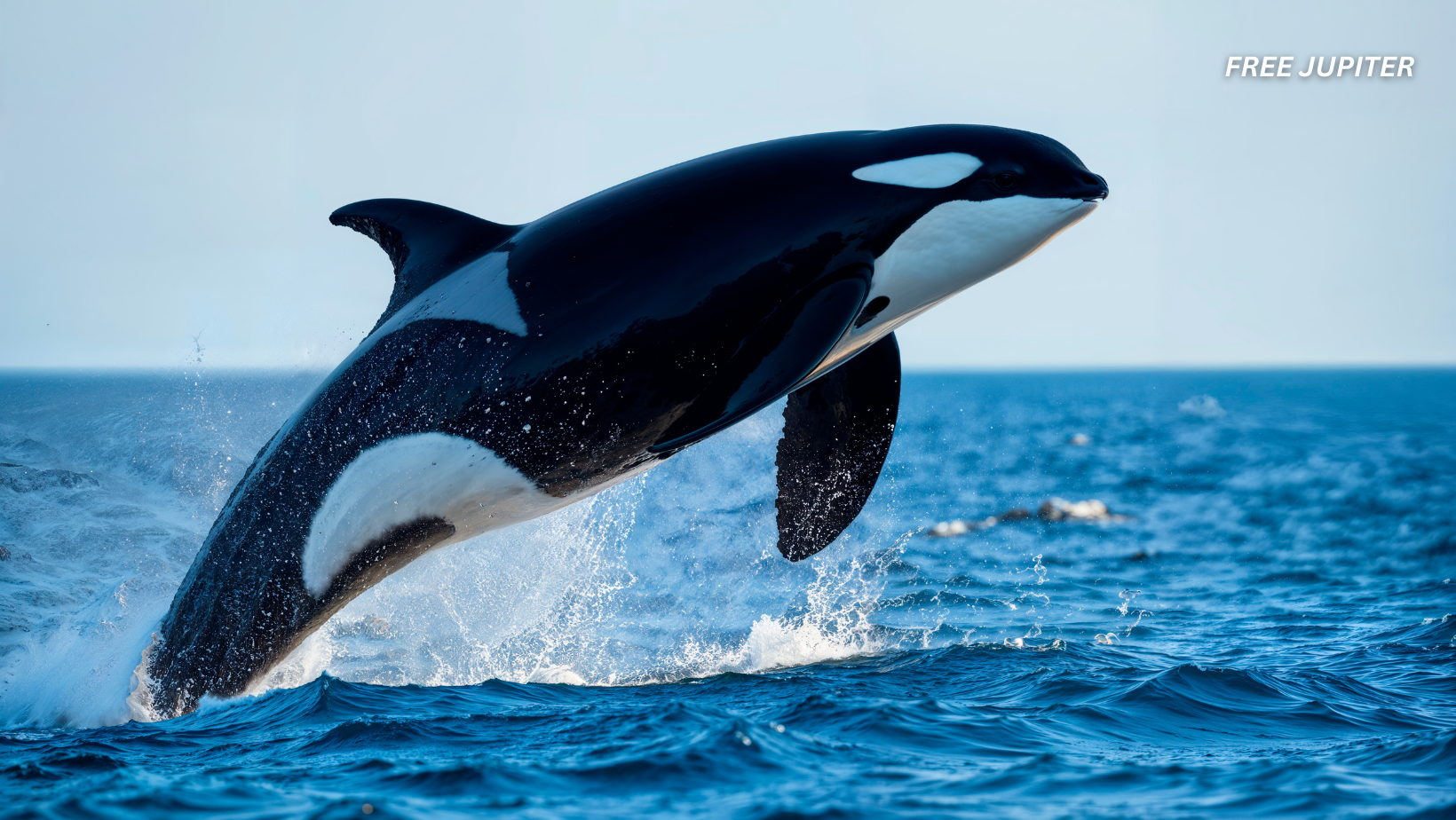Friendly Note: FreeJupiter.com shares general info for curious minds 🌟 Please fact-check all claims—and always check health matters with a professional 💙
Orcas, often referred to as killer whales, are widely known as the ocean’s largest members of the dolphin family and formidable apex predators. Their intelligence and complex social behavior have fascinated researchers for decades. However, a surprising discovery has recently emerged, revealing that these marine mammals can imitate human speech sounds. This remarkable ability challenges traditional views of animal communication and opens new doors to understanding orca cognition.
The Ocean’s Giants: More Than Just Hunters
Orcas are not only powerful hunters but also highly social creatures with a brain size that is the largest among marine mammals. They can travel impressive distances-up to 40 miles daily-showcasing endurance and adaptability in their natural environment. Their hunting skills are so refined that they sometimes pursue prey onto land, a rare behavior among marine predators.
Despite their fearsome reputation, orcas communicate through a complex system of vocalizations. Each pod has unique calls, often described as dialects, that help maintain social bonds and coordinate group activities. Scientists have long studied these vocalizations to learn more about orca societies. But until recently, the idea that orcas could mimic sounds from an entirely different species-humans-remained unexplored.
The Groundbreaking Study: International Collaboration
In 2018, a team of researchers from Germany, Spain, the United Kingdom, and Chile published a study in Proceedings of the Royal Society B: Biological Sciences that documented orcas’ ability to imitate human speech. The study was led by Josep Call, a professor specializing in the evolutionary origins of the mind at the University of St Andrews. Call and his colleagues sought to test how flexible orcas are when it comes to copying unfamiliar sounds.
“We wanted to present the orcas with sounds that are not part of their natural repertoire,” Call explained. “For example, the word ‘hello’ is not something a killer whale would normally say.” This approach aimed to push the boundaries of what was known about orca vocal learning.
Read more: Florida Man Gored by Massive Bison at Yellowstone After Ignoring Wildlife Distance Guidelines
Training Wikie: A Vocal Experiment
The star of the study was Wikie, a 14-year-old female orca residing at Marineland Aquarium in Antibes, France. The researchers began by teaching Wikie to imitate three familiar orca sounds produced by her three-year-old calf. This initial step helped establish her ability to replicate sounds she already knew.
Next, Wikie was introduced to five orca calls she had never encountered before, testing her capacity to learn novel vocalizations. The final phase was the most intriguing: exposing Wikie to human speech. She listened to a series of six human sounds, including the words “hello,” “Amy,” “ah ha,” “one, two,” and “bye bye,” as well as three orca sounds made by a human.
The Results: Orca Speech Imitation
Wikie’s responses were astonishing. She was able to mimic several human words, sometimes with surprising accuracy on the very first attempt. The recordings captured her vocalizations, which ranged from eerie and otherworldly to surprisingly clear renditions of human speech.
Listeners have had mixed reactions to these recordings. Some found the orca’s “hello” eerie enough to describe as “demonic,” while others joked about supernatural explanations. Despite the unsettling tone of some sounds, many were deeply impressed by the orca’s ability to reproduce human-like vocalizations.
One viewer shared, “This makes me tear up, the fact that we live in such a beautiful world filled with wonderful creatures.” Such responses highlight the emotional impact of hearing a wild animal imitate human speech.
Understanding Orca Vocal Learning
Wikie’s ability to imitate human sounds is remarkable, especially considering the anatomical differences between orca and human vocal systems. Orcas produce sounds using structures very different from human vocal cords, yet they can approximate human speech closely enough to be recognizable.
Josep Call emphasized this point: “Even though the morphology of orcas is so different, they can still produce sounds that come close to what another species, in this case us, can produce.” However, Call also clarified that there is no evidence Wikie understands the meaning of the words she mimics. The vocalizations are imitations rather than expressions of comprehension.
Implications for Orca Communication and Culture
The study’s findings provide the first direct evidence that orcas can learn new sounds through vocal imitation. This ability likely plays a key role in the development of the distinct dialects observed in wild orca populations. These dialects vary between pods and are believed to be culturally transmitted rather than genetically determined.
The capacity for vocal learning suggests orcas have sophisticated social learning mechanisms, allowing them to adapt their communication to different social contexts. This trait places them among a select group of animals capable of complex vocal imitation, including some birds, dolphins, and elephants.
Read more:Cat Miraculously Survives Fall That Killed Two Florida Hikers In Utah
Challenges and Future Directions
While Wikie’s vocal mimicry offers valuable insights, the research was conducted in a controlled environment, which differs significantly from the wild. To fully understand how orcas learn and use vocalizations, scientists need to study wild populations more extensively.
Josep Call and his team advocate for further research involving wild orcas to explore the extent of vocal imitation in natural settings. Such studies could reveal how orcas acquire new sounds, how these sounds function within their social groups, and how vocal traditions evolve over time.
The Broader Significance
Wikie’s vocal experiments do more than demonstrate orca mimicry; they challenge our understanding of animal intelligence and communication. The ability to imitate sounds from another species suggests a level of auditory processing and vocal control that is rare in the animal kingdom.
This discovery enriches our appreciation of orcas as complex, intelligent beings with rich social lives. It also invites us to reconsider the boundaries between human and animal communication, highlighting the deep connections that can exist across species.
Public Reaction: Fascination and Wonder
The recordings of Wikie’s human-like sounds have captivated the public, sparking a mixture of wonder, amusement, and a touch of unease. The eerie quality of some vocalizations has led to playful speculation about supernatural influences, while others have expressed heartfelt admiration for the orca’s talents.
Ultimately, these reactions reflect a profound curiosity about the natural world and the surprising abilities of its inhabitants. Wikie’s vocalizations remind us that intelligence and adaptability can manifest in unexpected ways, even beneath the waves.
Conclusion: A New Chapter in Orca Research
The discovery that orcas can imitate human speech sounds marks a significant milestone in marine biology and animal cognition research. Wikie’s vocal mimicry provides compelling evidence of orcas’ advanced vocal learning abilities and opens new avenues for exploring their communication systems.
As scientists continue to study these remarkable creatures, we can anticipate further revelations about the complexity of orca minds and the richness of their acoustic world. In the meantime, Wikie’s voice offers a fascinating glimpse into the possibilities of cross-species communication, reminding us of the extraordinary intelligence that thrives beneath the ocean’s surface.










